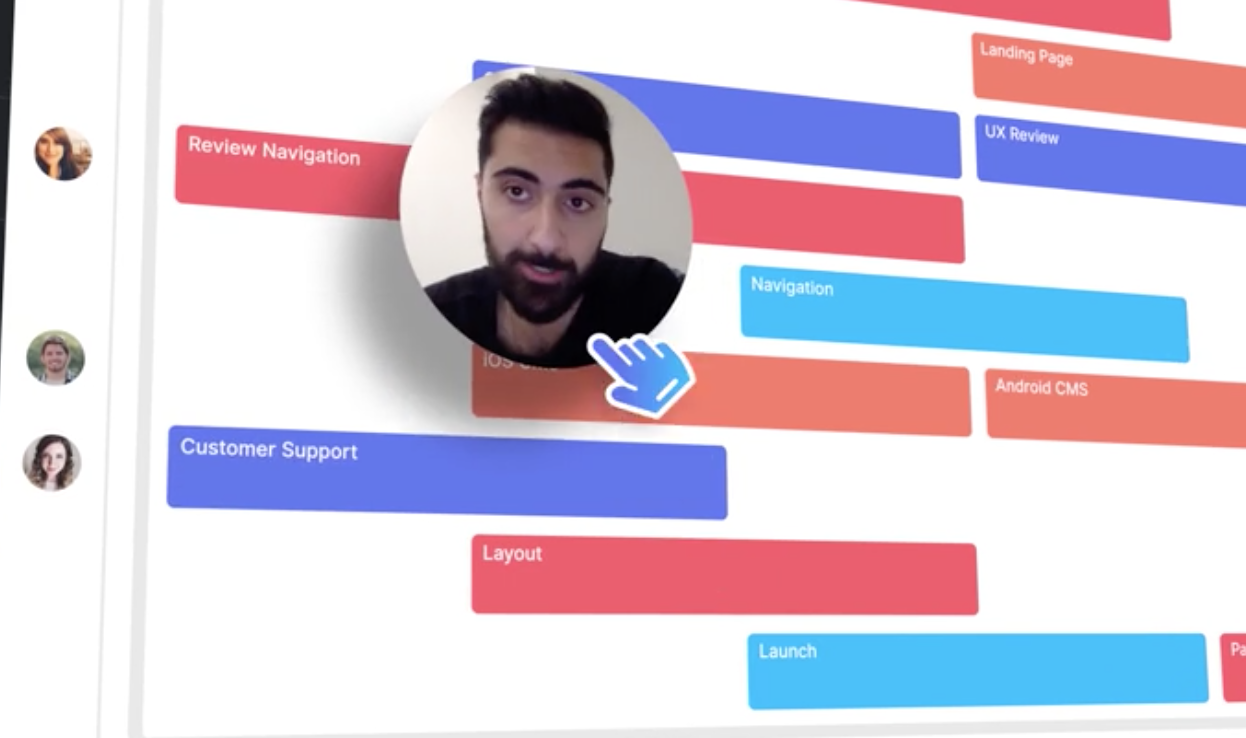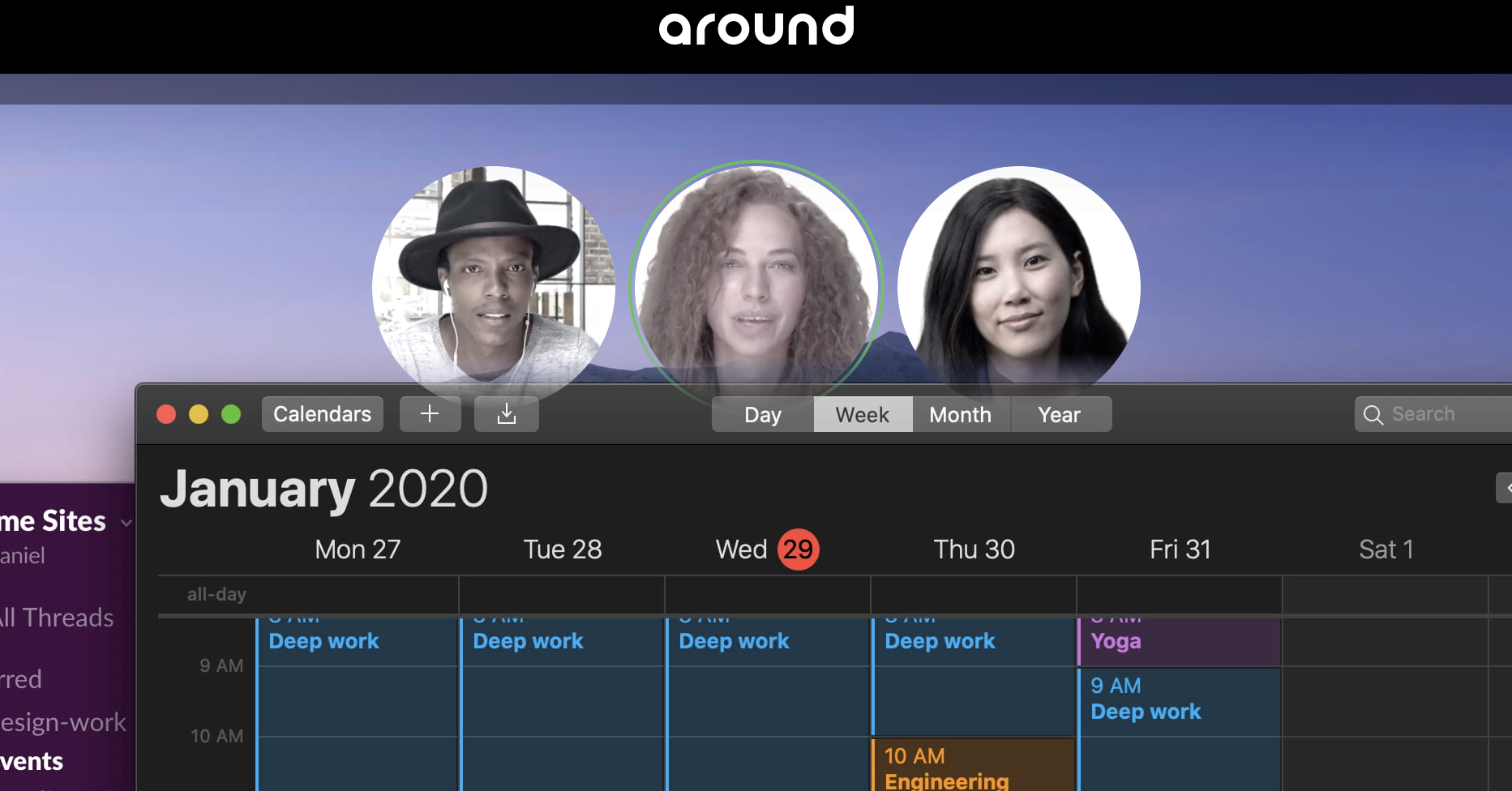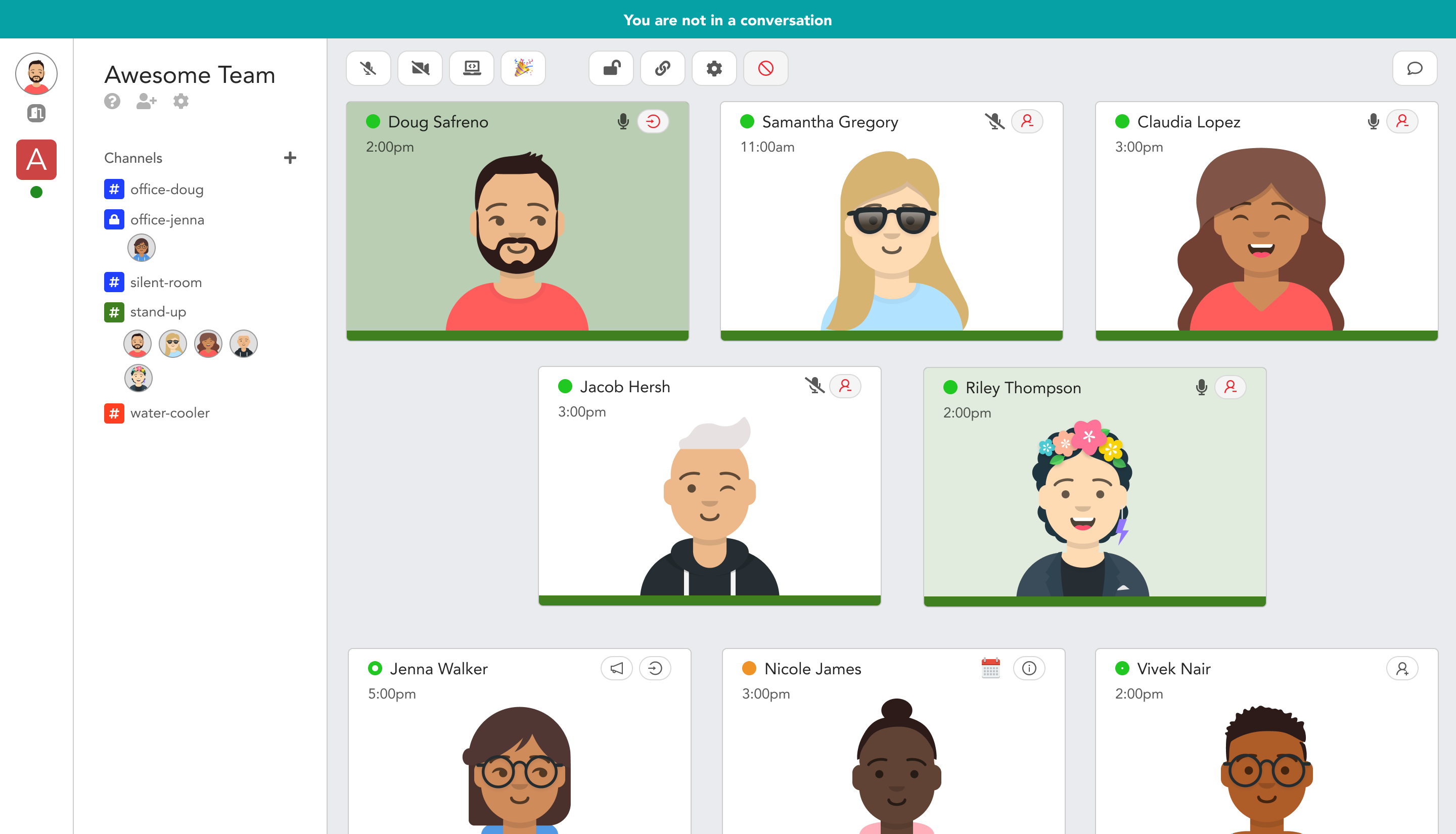Tech Nuggets with Technology: This Blog provides you the content regarding the latest technology which includes gadjets,softwares,laptops,mobiles etc
Sunday, April 19, 2020
Government Stops Sale of Non-Essential Items Through E-Commerce Platforms
Saturday, April 18, 2020
Profile of and Q&A with pioneering computer scientist Donald Knuth, who is still writing his magnum opus The Art of Computer Programming, which he began in 1962 (Susan D'Agostino/Quanta Magazine)
Susan D'Agostino / Quanta Magazine:
Profile of and Q&A with pioneering computer scientist Donald Knuth, who is still writing his magnum opus The Art of Computer Programming, which he began in 1962 — For pioneering computer scientist Donald Knuth, good coding is synonymous with beautiful expression.
Uber's sick pay policy for drivers has changed several times amid the pandemic, excluding some who need it the most and increasing the documentation required (Edward Ongweso Jr/VICE)
Edward Ongweso Jr / VICE:
Uber's sick pay policy for drivers has changed several times amid the pandemic, excluding some who need it the most and increasing the documentation required — The pandemic makes clear that Uber sees its own well-being as divergent from that of its workers.
Riot launches one of the biggest bug bounty programs in gaming, offering up to $100K for finding security flaws in its controversial Vanguard anti-cheat system (Ian Walker/Kotaku)
Ian Walker / Kotaku:
Riot launches one of the biggest bug bounty programs in gaming, offering up to $100K for finding security flaws in its controversial Vanguard anti-cheat system — Riot has posted one of the biggest—if not the biggest—bounties in gaming, offering people up to $100,000 if they can find …
Researchers say an unsecured server storing info on 42M messaging accounts, nearly all from Iran and tied to Telegram, was part of Iran's spying operation (Ryan Gallagher/Bloomberg)
Ryan Gallagher / Bloomberg:
Researchers say an unsecured server storing info on 42M messaging accounts, nearly all from Iran and tied to Telegram, was part of Iran's spying operation — - ‘Hunting System’ contained data on 42 million chat accounts — Information on server from users of Telegram and its imitators
Filing: NLRB is looking into claims that Amazon retaliated against workers who participated in labor protests on the pretext they broke social distancing rules (Caroline O'Donovan/BuzzFeed News)
Caroline O'Donovan / BuzzFeed News:
Filing: NLRB is looking into claims that Amazon retaliated against workers who participated in labor protests on the pretext they broke social distancing rules — As employees, labor activists, and lawmakers decry Amazon's firing of employees involved in labor protests …
Pokémon Go developer Niantic names its current board member Megan Quinn as COO, who was most recently a partner at VC firm Spark Capital (James Batchelor/GamesIndustry.biz)
James Batchelor / GamesIndustry.biz:
Pokémon Go developer Niantic names its current board member Megan Quinn as COO, who was most recently a partner at VC firm Spark Capital — Former employee leaves position at Spark Capital to return to Pokmon Go developer — Niantic has appointed a new COO — and it's a familiar face for the firm.
How to train a smartphone to recognise your face with a mask
Spontaneous social apps that let users join video, voice, and chat rooms on a whim have become popular under lockdowns, like exclusive voice chat app Clubhouse (Josh Constine/TechCrunch)
Josh Constine / TechCrunch:
Spontaneous social apps that let users join video, voice, and chat rooms on a whim have become popular under lockdowns, like exclusive voice chat app Clubhouse — Forget the calendar invite. Just jump into a conversation. That's the idea powering a fresh batch of social startups poised …
Some Instacart workers are frustrated over the delay in safety kits the company promised them on April 2; Instacart says it caps the daily number of kit orders (Arielle Pardes/Wired)
Arielle Pardes / Wired:
Some Instacart workers are frustrated over the delay in safety kits the company promised them on April 2; Instacart says it caps the daily number of kit orders — Instacart promised it would provide masks and sanitizer kits weeks ago. Now the company claims the delay is by design.
Cameo, which lets fans pay for shoutout videos from celebs, has become a gig economy for celebs during the pandemic as some use it to compensate for income loss (Zach Schonfeld/VICE)
Zach Schonfeld / VICE:
Cameo, which lets fans pay for shoutout videos from celebs, has become a gig economy for celebs during the pandemic as some use it to compensate for income loss — On March 20, Steven Galanis, the CEO and co-founder of Cameo, took a call from Akon, the R&B singer behind the 2006 hit “Smack That.”
Clubhouse voice chat leads a wave of spontaneous social apps
Forget the calendar invite. Just jump into a conversation. That’s the idea powering a fresh batch of social startups poised to take advantage of our cleared schedules amidst quarantine. But they could also change the way we work and socialize long after COVID-19 by bringing the free-flowing, ad-hoc communication of parties and open office plans online. While “Live” has become synonymous with performative streaming, these new apps instead spread the limelight across several users as well as the task, game, or discussion at hand.
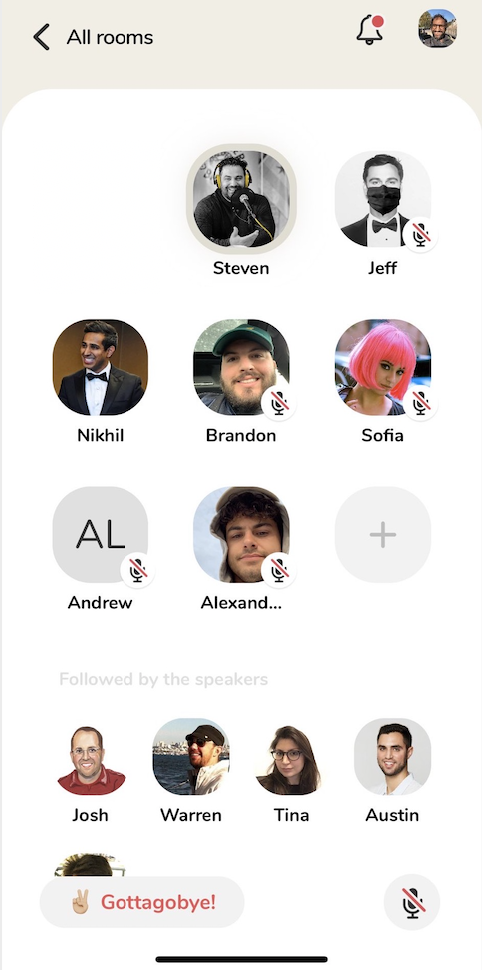 The most buzzy of these startups is Clubhouse, an audio-based social network where people can spontaneously jump into voice chat rooms together. You see the unlabeled rooms of all the people you follow, and you can join to talk or just listen along, milling around to find what interests you. High-energy rooms attract crowds while slower ones see participants slip out to join other chat circles.
The most buzzy of these startups is Clubhouse, an audio-based social network where people can spontaneously jump into voice chat rooms together. You see the unlabeled rooms of all the people you follow, and you can join to talk or just listen along, milling around to find what interests you. High-energy rooms attract crowds while slower ones see participants slip out to join other chat circles.
Clubhouse blew up this weekend on VC Twitter as people scrambled for exclusive invites, humblebragged about their membership, or made fun of everyone’s FOMO. For now, there’s no public app or access. The name Clubhouse perfectly captures how people long to be part of the in-crowd.
Clubhouse was built by Paul Davison, who previously founded serendipitous offline people-meeting location app Highlight and reveal-your-whole-camera-roll app Shorts before his team was acquired by Pinterest in 2016. This year he debuted his Alpha Exploration Co startup studio and launched Talkshow for instantly broadcasting radio-style call-in shows. Spontaneity is the thread that ties Davison’s work together, whether its for making new friends, sharing your life, transmitting your thoughts, or having a discussion.
It’s very early days for Clubhouse. It doesn’t even have a website. There’s no telling exactly what it will be like if or when it officially launches, and Davison and his co-founder Rohan Seth declined to comment. But the positive reception shows a desire for a more immediate, multi-media approach to discussion that updates what Twitter did with text.
Sheltered From Surprise
What quarantine has revealed is that when you separate everyone, spontaneity is a big thing you miss. In your office, that could be having a random watercooler chat with a co-worker or commenting aloud about something funny you found on the internet. At a party, it could be wandering up to chat with group of people because you know one of them or overhear something interesting. That’s lacking while we’re stuck home since we’ve stigmatized randomly phoning a friend, differing to asynchronous text despite its lack of urgency.

Clubhouse founder Paul Davison. Image Credit: JD Lasica
Scheduled Zoom calls, utilitarian Slack threads, and endless email chains don’t capture the thrill of surprise or the joy of conversation that giddily revs up as people riff off each other’s ideas. But smart app developers are also realizing that spontaneity doesn’t mean constantly interrupting people’s life or workflow. They give people the power to decide when they are or aren’t available or signal that they’re not to be disturbed so they’re only thrust into social connection when they want it.
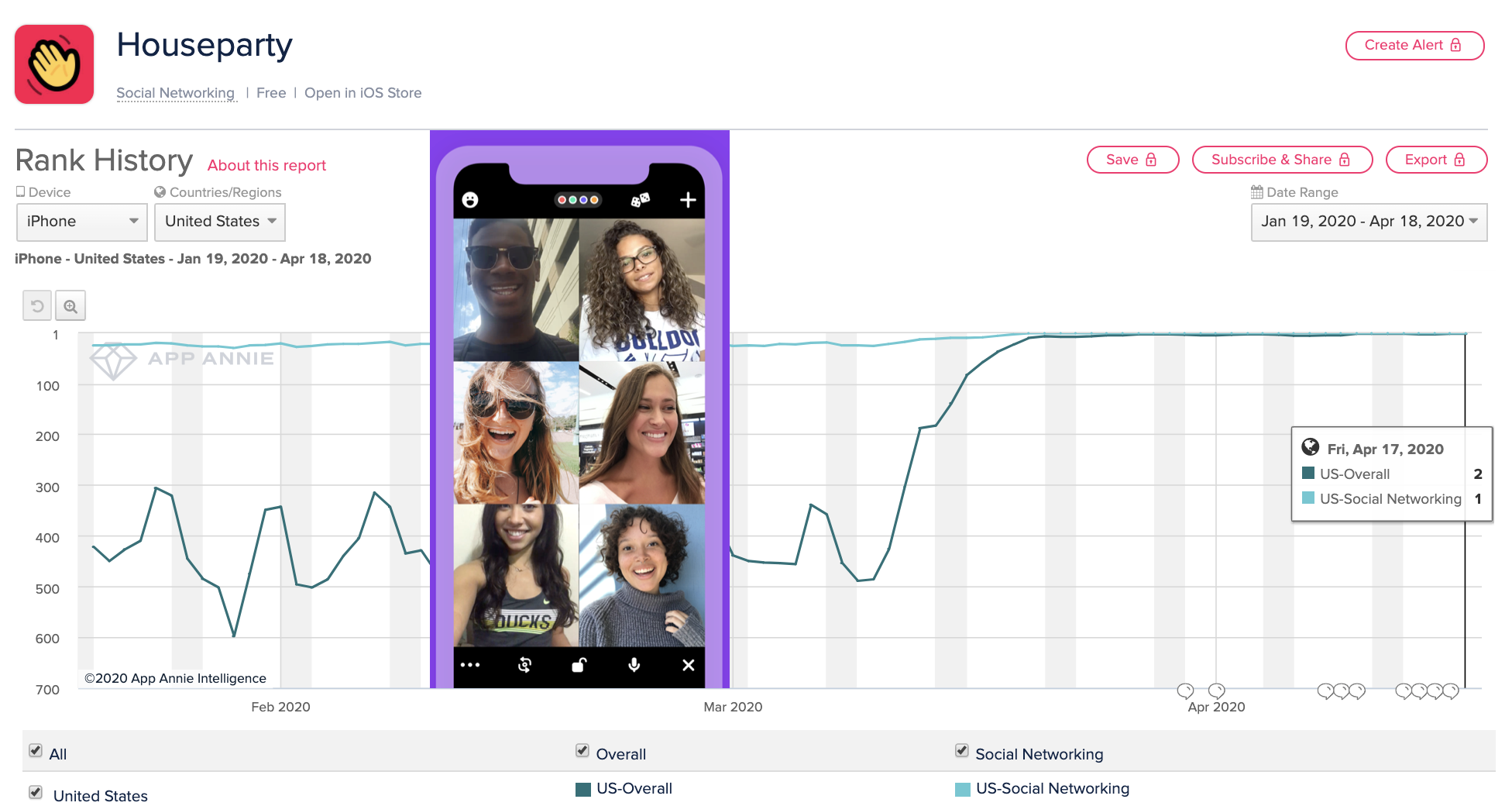
Houseparty chart ranks via AppAnnie
Houseparty embodies this spontaneity. It’s become the breakout hit of quarantine by letting people on a whim join group video chat rooms with friends the second they open the app. It saw 50 million downloads in a month, up 70X over its pre-COVID levels in some places. It’s become the #1 social app in 82 countries including the US, and #1 overall in 16 countries.
Originally built for gaming, Discord lets communities spontaneously connect through persistent video, voice, and chat rooms. It’s seen a 50% increase in US daily voice users with spikes in shelter-in-place early adopter states like California, New York, New Jersey, and Washington. Bunch, for video chat overlayed on mobile gaming, is also climbing the charts and going mainstream with its user base shifting to become majority female as they talk for 1.5 million minutes per day. Both apps make it easy to join up with pals and pick something to play together.

The Impromptu Office
Enterprise video chat tools are adapting to spontaneity as an alternative to heavy-handed, pre-meditated Zoom calls. There’s been a backlash as people realize they don’t get anything done by scheduling back-to-back video chats all day.
- Loom lets you quickly record and send a video clip to co-workers that they can watch at their leisure, with back-and-forth conversation sped up because videos are uploaded as they’re shot.
- Around overlays small circular video windows atop your screen so you can instantly communicate with colleagues while most of your desktop stays focused on your actual work.
- Screen exists as a tiny widget that can launch a collaborative screenshare where everyone gets a cursor to control the shared window so they can improvisationally code, design, write, and annotate.
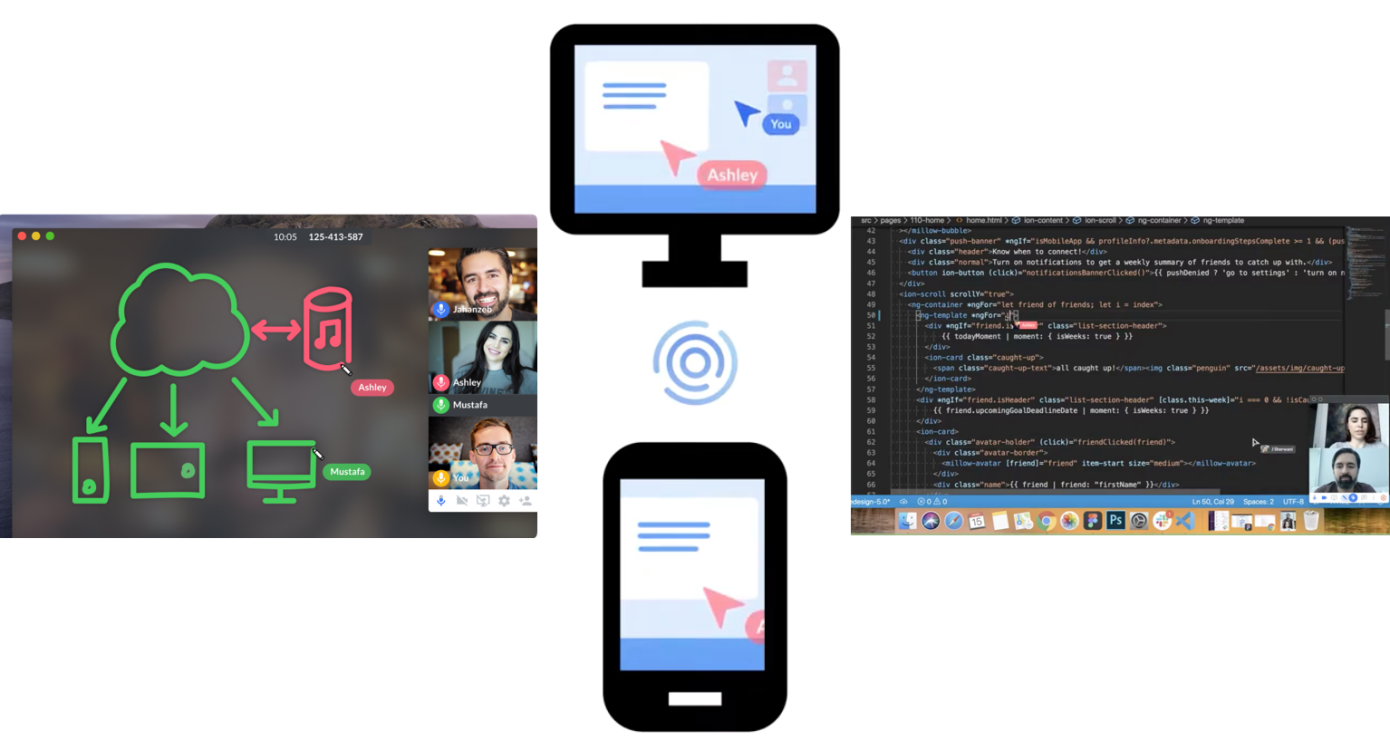
Screen
- Pragli is an avatar-based virtual office where you can see if someone’s in a calendar meeting, away, or in flow listening to music so you know when to instantly open a voice or video chat channel together without having to purposefully find a time everyone’s free. But instead of following you home like Slack, Pragli lets you sign in and out of the virtual office to start and end your day.
Raising Our Voice
While visual communication has been the breakout feature of our mobile phones by allowing us to show where we are, shelter-in-place means we don’t have much to show. That’s expanded the opportunity for tools that take a less-is-more approach to spontaneous communication. Whether for remote partying or rapid problem solving, new apps beyond Clubhouse are incorporating voice rather than just video. Voice offers a way to rapidly exchange information and feel present together without dominating our workspace or attention, or forcing people into an uncomfortable spotlight.
High Fidelity is Second Life co-founder Philip Rosedale’s $72 million-funded current startup. After recently pivoting away from building a virtual reality co-working tool, High Fidelity has begun testing a voice and headphones-based online event platform and gathering place. The early beta lets users move their dot around a map and hear the voice of anyone close to them with spatial audio so voices get louder as you get closer to someone, and shift between your ears as you move past them. You can spontaneously approach and depart little clusters of dots to explore different conversations within earshot.
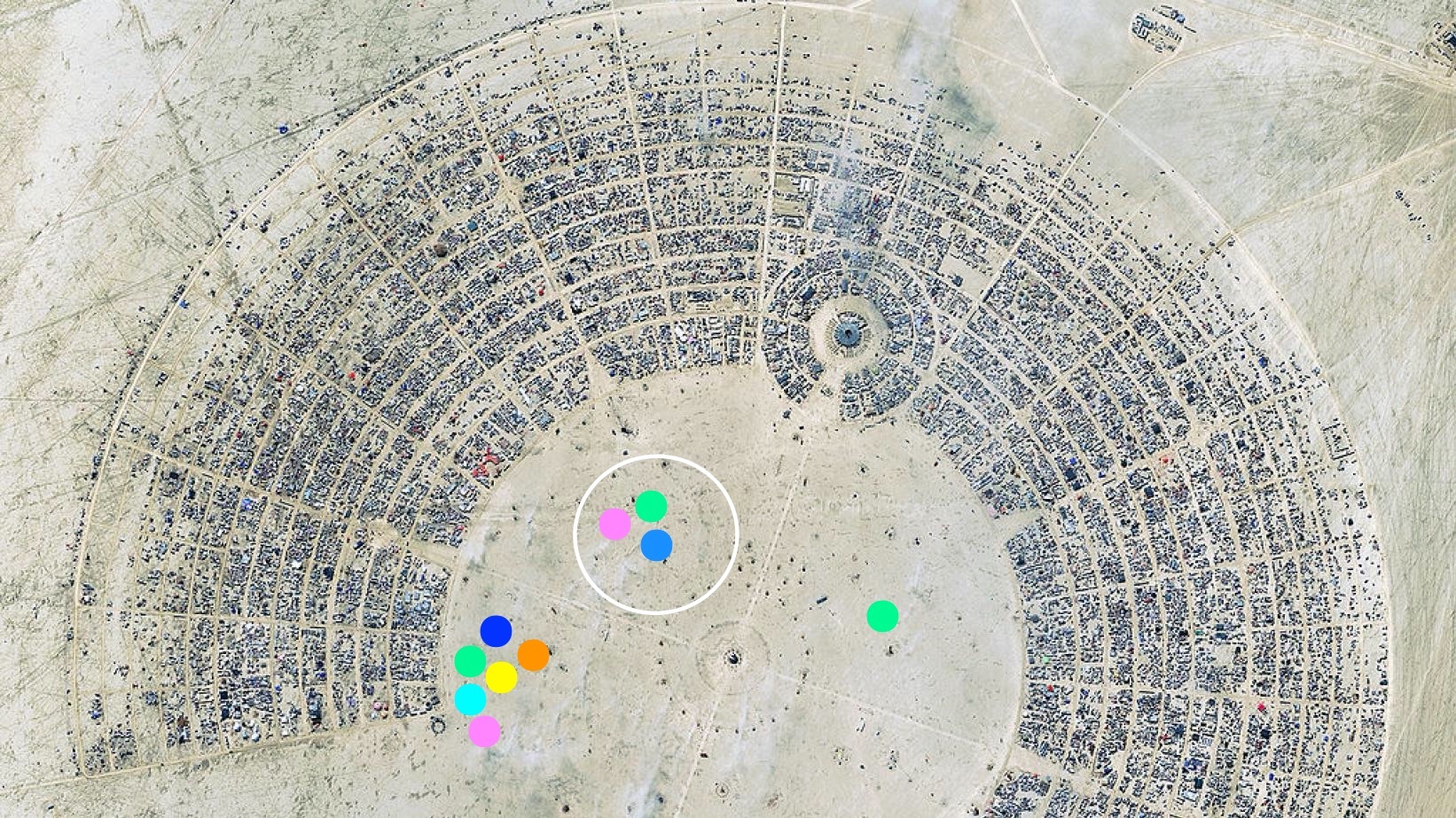
An unofficial mockup of High Fidelity’s early tests. Image Credits: DigitalGlobe (opens in a new window) / Getty Images
High Fidelity is currently using a satellite photo of Burning Man as its test map. It allows DJs to set up in different corners, and listeners to stroll between them or walk off with a friend to chat, similar to the real offline event. Since Burning Man was cancelled this year, High Fidelity could potentially be a candidate for holding the scheduled virtual version the organizers have promised.
Houseparty’s former CEO Ben Rubin and Skype GM of engineering Brian Meek are building a spontaneous teamwork tool called Slashtalk. Rubin sold Houseparty to Fortnite-maker Epic in mid-2019, but the gaming giant largely neglected the app until its recent quarantine-driven success. Rubin left.

His new startup’s site explains that “/talk is an anti-meeting tool for fast, decentralized conversations. We believe most meetings can be eliminated if the right people are connected at the right time to discuss the right topics, for just as long as necessary.” It lets people quickly jump into a voice or video chat to get something sorted without delaying until a calendared collab session.
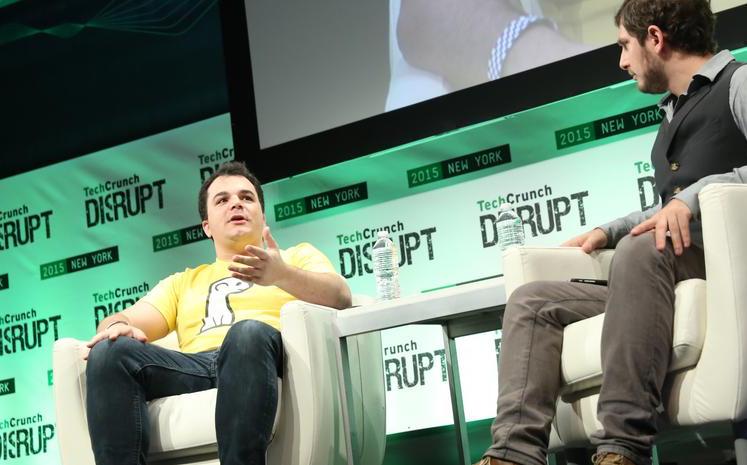
Slashtalk co-founder Ben Rubin at TechCrunch Disrupt NY 2015
Whether for work or play, these spontaneous apps can conjure times from our more unstructured youth. Whether sifting through the cafeteria or school yard, seeing who else is at the mall, walking through halls of open doors in college dorms, or hanging at the student union or campus square, the pre-adult years offer many opportunities for impromptu social interation.
As we age and move into our separate homes, we literally erect walls that limit our ability to perceive the social cues that signal that someone’s available for unprompted communication. That’s spawned apps like Down To Lunch and Snapchat acquisition Zenly, and Facebook’s upcoming Messenger status feature designed to break through those barriers and make it feel less desperate to ask someone to hang out offline.
But while socializing or collaborating IRL requires transportation logistics and usually a plan, the new social apps discussed here bring us together instantly, thereby eliminating the need to schedule togetherness ahead of time. Gone too are the geographic limits restraining you to connect only with those within a reasonable commute. Digitally, you can pick from your whole network. And quarantines have further opened our options by emptying parts of our calendars.
Absent those frictions, what shines through is our intention. We can connect with who we want and accomplish what we want. Spontaneous apps open the channel so our impulsive human nature can shine through.
Friday, April 17, 2020
The tech industry, with an eye towards improving its reputation, is quickly pivoting to offer remedies to the pandemic crisis (Shelly Banjo/Bloomberg)
Shelly Banjo / Bloomberg:
The tech industry, with an eye towards improving its reputation, is quickly pivoting to offer remedies to the pandemic crisis — Before the pandemic, Yiying Lu was known for her work designing the Twitter Fail Whale and the dumpling and boba tea emojis. In the past few weeks, Lu said she was called to a higher purpose.
Facebook is adding a new hug reaction to the Like button
The Coronavirus has torn through the entire globe and companies have come together to help people cope with the crisis. Some have gone out of their way to give the public more information while others like Sony have made games free to play in the comfort of your own home. Now, Facebook looks like it’s trying to help as well. The company has just added a new reaction alongside the Like button and its a ‘Hug’ option.
We’re launching new Care reactions on @facebookapp and @Messenger as a way for people to share their support with one another during this unprecedented time. We hope these reactions give people additional ways to show their support during the #COVID19 crisis. pic.twitter.com/HunGyK8KQw
— Alexandru Voica (@alexvoica) April 17, 2020The reaction is an animated emoji hugging a heart, representing a ‘show of support’ for your friends and family during these dangerous and trying times. You can always use the ‘Love’ reaction but according to Facebook, this shows that you support one another during this time.
The reaction is not present on the Messenger app though and has been replaced by a purple heart instead. To access it, you have to open your reactions, then long-press on a message and the heart reaction and then tap OK to enable the purple heart reaction.
On Facebook, we will launch a seventh Reaction alongside the existing six. The new Care Reaction will start rolling out next week globally and you can use it to react to posts, comments, images, videos, or other content on the app and https://t.co/t0PZL74vjg pic.twitter.com/PkpbCoPc4F
— Alexandru Voica (@alexvoica) April 17, 2020This may not seem like a big step, but with more people interacting with each other because of the pandemic, it shows that even a small gesture might make a huge difference. Facebook could also be teaming up with Reliance to launch a WeChat-like app for India. You can read more about it here.
The company has had its share of problems as well, with the Indian government demanding the social media giant to remove users spreading false information about the Coronavirus. You can read more about that here. The company has also launched a Messenger chatbot to share relevant info about the Coronavirus as well. You can read more about that here.
Ofcom opens an investigation into a pro-suicide forum, its first using the Online Safety Act; the BBC linked the unnamed forum to 50+ deaths in the UK (BBC)
BBC : Ofcom opens an investigation into a pro-suicide forum, its first using the Online Safety Act; the BBC linked the unnamed forum to 5...
-
Jake Offenhartz / Gothamist : Since October, the NYPD has deployed a quadruped robot called Spot to a handful of crime scenes and hostage...
-
Expanding its "Azure IP Advantage" programme, Microsoft is donating 500 patents to start-ups that are part of a non-profit organis...
